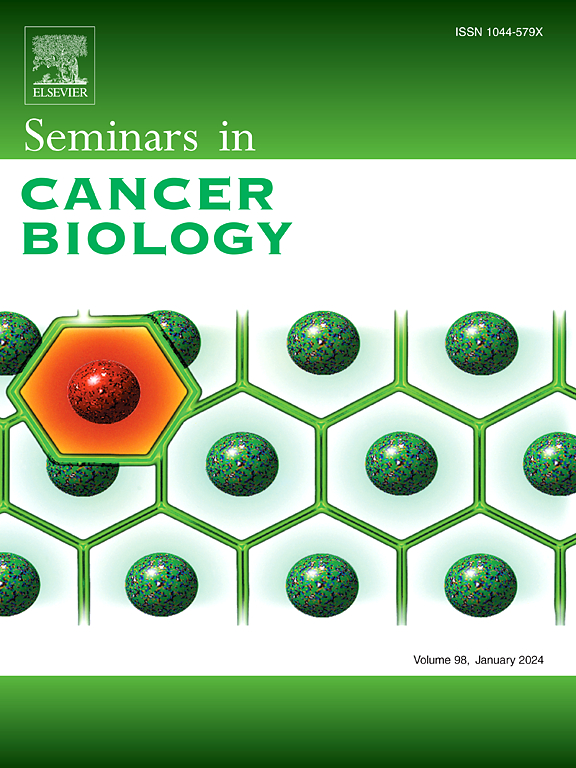靶向肿瘤中的矿物质代谢:信号通路和治疗策略的见解。
IF 12.1
1区 医学
Q1 ONCOLOGY
引用次数: 0
摘要
癌症仍然是全世界第二大死亡原因,这强调了对有效治疗和控制战略的迫切需要。必需矿物质,如铜、铁、锌、硒、磷、钙和镁,是各种生物过程不可或缺的组成部分,并通过改变代谢途径显著影响癌症的进展。例如,失调的铜水平促进肿瘤生长,而癌细胞在信号传导和氧化还原反应中对铁的依赖性增加。锌通过Akt-p21等途径影响肿瘤的发展。硒,主要通过其在硒蛋白中的作用,显示出抗癌潜力,但也可能有助于肿瘤的进展。同样,饮食中的磷酸盐通过激活信号通路加剧肿瘤的发生、转移和血管生成。钙是人体内最丰富的矿物质,在细胞内受到严格的调节,而它的失调是各种癌症的标志。另一方面,镁缺乏通过促进炎症和自由基诱导的DNA突变来促进癌症的进展。有趣的是,镁也起着双重作用,低水平的镁可以增强上皮-间质转化(EMT),这是癌症转移的一个关键过程。这种必需矿物质的复杂相互作用强调了它们作为治疗靶点的潜力。这些矿物质及其通路的失调可以被用来选择性地靶向癌细胞,提供新的治疗策略。本文综述了肿瘤生物学中这些微量元素异常积累或消耗的最新研究,并从动物模型、细胞系和临床样本中获得证据。我们还强调了这些矿物质作为癌症诊断和预后的生物标志物的潜力,以及涉及金属螯合剂、药理学剂和纳米技术的治疗方法。通过强调这些矿物质在癌症生物学中的复杂作用,我们的目标是在这个关键但尚未开发的肿瘤学领域激发进一步的研究。本文章由计算机程序翻译,如有差异,请以英文原文为准。
Targeting mineral metabolism in cancer: Insights into signaling pathways and therapeutic strategies
Cancer remains the second leading cause of death worldwide, emphasizing the critical need for effective treatment and control strategies. Essential minerals such as copper, iron, zinc, selenium, phosphorous, calcium, and magnesium are integral to various biological processes and significantly influence cancer progression through altered metabolic pathways. For example, dysregulated copper levels promote tumor growth, while cancer cells exhibit an increased dependency on iron for signaling and redox reactions. Zinc influences tumor development through pathways such as Akt-p21. Selenium, primarily through its role in selenoproteins, exhibits anticancer potential but may also contribute to tumor progression. Similarly, dietary phosphate exacerbates tumorigenesis, metastasis, and angiogenesis through signaling pathway activation. Calcium, the most abundant mineral in the body, is tightly regulated within cells, and its dysregulation is a hallmark of various cancers. Magnesium deficiency, on the other hand, promotes cancer progression by fostering inflammation and free radical-induced DNA mutations. Interestingly, magnesium also plays a dual role, with low levels enhancing epithelial-mesenchymal transition (EMT), a critical process in cancer metastasis. This complex interplay of essential minerals underscores their potential as therapeutic targets. Dysregulation of these minerals and their pathways could be exploited to selectively target cancer cells, offering novel therapeutic strategies. This review summarizes current research on the abnormal accumulation or depletion of these microelements in tumor biology, drawing evidence from animal models, cell lines, and clinical samples. We also highlight the potential of these minerals as biomarkers for cancer diagnosis and prognosis, as well as therapeutic approaches involving metal chelators, pharmacological agents, and nanotechnology. By highlighting the intricate roles of these minerals in cancer biology, we aim to inspire further research in this critical yet underexplored area of oncology.
求助全文
通过发布文献求助,成功后即可免费获取论文全文。
去求助
来源期刊

Seminars in cancer biology
医学-肿瘤学
CiteScore
26.80
自引率
4.10%
发文量
347
审稿时长
15.1 weeks
期刊介绍:
Seminars in Cancer Biology (YSCBI) is a specialized review journal that focuses on the field of molecular oncology. Its primary objective is to keep scientists up-to-date with the latest developments in this field.
The journal adopts a thematic approach, dedicating each issue to an important topic of interest to cancer biologists. These topics cover a range of research areas, including the underlying genetic and molecular causes of cellular transformation and cancer, as well as the molecular basis of potential therapies.
To ensure the highest quality and expertise, every issue is supervised by a guest editor or editors who are internationally recognized experts in the respective field. Each issue features approximately eight to twelve authoritative invited reviews that cover various aspects of the chosen subject area.
The ultimate goal of each issue of YSCBI is to offer a cohesive, easily comprehensible, and engaging overview of the selected topic. The journal strives to provide scientists with a coordinated and lively examination of the latest developments in the field of molecular oncology.
 求助内容:
求助内容: 应助结果提醒方式:
应助结果提醒方式:


